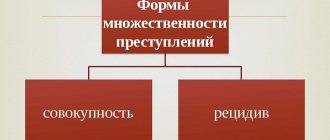The imposition of punishment for recidivism of crimes has specificity due to the fact that the corrective measures applied to the offender do not bring the desired result.
The failure of the previous experience shows that it is necessary to strengthen the influence on the defendant to return him to an honest life. Multi-channel free hotline Legal advice on criminal law. Every day from 9.00 to 21.00
Moscow and region: +7 (495) 662-44-36
St. Petersburg: +7 (812) 449-43-40
Normative base
The imposition of punishment for recidivism is regulated by the current rules of law, the Criminal Code of the Russian Federation.
In Art. 18 of the Criminal Code of the Russian Federation, relapse is an intentional violation of the law by a person who has already committed a similar intentional act.
It also introduces the principle of tightening preventive measures in such situations and contains an indication of the types of relapse:
- Dangerous (note: slander, vandalism).
- Particularly dangerous (note: murder).
Article 58 of the Criminal Code indicates where a repeat offender serves his sentence imposed by the court.
In Art. 68 of the Criminal Code of the Russian Federation, a set of indicators is compiled that are necessary to select the limit for the shortest time for applying corrective measures.
The correct interpretation is important for the judge when determining the degree of guilt of the defendant and, although case law in Russia is not developed, judicial practice and explanations of the Plenum of the Supreme Court of the Russian Federation have a significant influence. Based on them, the most severe punishment of those proposed in the Special Part of the Criminal Code of the Russian Federation is applied to a repeat offender.
Exceptional and mitigating circumstances that make it possible to ease the penalty - Art. 61 and 64 of the Criminal Code of the Russian Federation, aggravating circumstances - Art. 63 of the Criminal Code of the Russian Federation.
Commentary on Article 68 of the Criminal Code of the Russian Federation
1. In accordance with Part 5 of Art. 18 recidivism of crimes entails a more severe punishment on the basis and within the limits established by the Criminal Code of the Russian Federation. The commented article specifies these provisions, providing additional criteria for selecting punishment in case of recidivism: a) the number of previously committed crimes; b) the nature and degree of their public danger; c) circumstances due to which the corrective effect of the previous punishment turned out to be insufficient; d) the nature and degree of public danger of newly committed crimes.
2. On the concept of the nature and degree of social danger of a crime, see commentary. to part 3 art. 60. Since the content of the first additional criterion for sentencing covers the severity of previously committed crimes, it is necessary to establish for what crimes the person was previously convicted (under what article the acts were classified), what punishment was sentenced to (type, terms or amounts), and in case of multiple crimes - whether they were identical, homogeneous or heterogeneous. The age at which these crimes were committed and the perpetrator was convicted is also important. In particular, by virtue of Part 4 of Art. 18 previous convictions for crimes of minor gravity, either suspended or with a suspended sentence, as well as for crimes committed by a person under the age of 18, as well as expunged and expunged convictions, are not taken into account when recognizing a recidivism of crimes, and therefore, in such a situation, the provisions of the commentary . Articles do not apply at all.
3. Finding out the circumstances due to which the previous corrective action turned out to be ineffective is important in terms of predicting the further behavior of the convicted person and determining the sufficiency of the chosen punishment as a means of achieving its goals (correction, prevention of new crimes and restoration of social justice). This means the availability of data on the measures and duration of correctional and educational influence applied by the relevant body for the execution of punishment, on the response to these measures on the part of the convicted person, etc.
4. Taking into account the nature and extent of newly committed crimes is necessary in two respects. Firstly, to determine the punishment for the crimes themselves: ultimately and first of all, a person is punished for what he has done, therefore it is necessary to take into account the gravity of the crimes committed. Secondly, it is necessary to correlate the nature of the newly committed act with the nature of the previously committed one: what is the time gap between the moment of release from punishment and the commission of a new crime, are the previous and new acts homogeneous or heterogeneous, etc.
5. Recidivism always indicates a significant increase in the social danger of the perpetrator’s personality, and often the crime being committed again. Related to this is the idea of formalizing the strength of the influence of recidivism on punishment: when it is established, new (lower) limits for choosing a measure of influence arise: regardless of the type of recidivism (simple, dangerous, especially dangerous), the term (or amount) of punishment cannot be lower than the corresponding share - one the third part - the maximum term (or amount) of the most severe type of punishment provided for by the sanction for the crime committed. In this case, the court cannot go beyond the upper limits of the sanction of the article, except in cases specifically provided for by law (for example, applying deprivation of a special or military rank as an additional punishment - Article 48).
6. Determining punishment within these new limits is the duty, not the right of the court. The exception is the situations mentioned in part 3 of the comment. Article: the mentioned rule for imposing punishment (Part 2) may not be applied if: a) the court in the case established mitigating circumstances provided for in Art. 61. In this case, the term (amount) of punishment may be assigned less than 1/3 of the part (but within the sanction of the corresponding article of the Special Part of the Criminal Code); b) there are exceptional circumstances in the case, provided for in Art. 64. In this case, the court may impose a punishment according to the rules established by this article.
If there are: a) mitigating or b) exceptional circumstances, the court is obliged to motivate its decision not to apply the rules of part 2 of the comment. article, and the court verdict must contain a reference to Part 3 of the comment. article, because - as follows from the text of the commentary. Article - deviation from the rule set out in Part 2 is a right and not an obligation of the court.
7. It is easy to see that the comment is outside of legislative regulation. The articles turned out to be situations where: 1) in the presence of a relapse (aggravating circumstance), a jury verdict of leniency was made. In accordance with Part 4 of Art. 65, relapse as an aggravating circumstance in such situations is not subject to consideration by the court and, therefore, the rules of part 2 comment. articles are not valid; 2) there is a combination of relapse and unfinished crime. In such a situation, we can talk about competition of norms and the procedure that is most favorable for the convicted person should be applied (see paragraph 6 of the commentary to Article 66). In particular, it is necessary to apply the comment rules. article, proceed from the maximum sentence that can be assigned taking into account the requirements of Art. 66 (see paragraph 4 of paragraph 15 of the Resolution of the Plenum of the Armed Forces of the Russian Federation dated January 11, 2007 No. 2).
Features of sentencing
The imposition of punishment for the recurrence of a crime of any kind must take into account the features described in Art. 68 of the Criminal Code of the Russian Federation:
- what offense was committed and how dangerous it is for society applies to both the new offense and the previous one;
- conditions that contributed to the poor outcome of previously applied corrective measures;
- according to Part 3 of Art. 68 of the Criminal Code of the Russian Federation, the existence of mitigating or exceptional factors.
When considering the totality of facts, an understanding is formed of how strongly a person strives to commit illegal actions and how fruitful the corrective influence already exerted on him is.
This means that when the defendant commits an offense that is less serious or not as dangerous as the previous one, some, albeit insufficient, correction is expected.
If the repeated offense is more serious and dangerous, the opinion arises that the corrective measures taken did not produce any results and the person continues to develop a desire to commit acts that violate the law. This usually results in increased punishment.
The court evaluates where the previous sentence was served and how, the reasons explaining the poor outcome of the correctional institution.
Determining the nature and degree of danger of previously committed crimes
According to the Basic Law, the rights and freedoms of man and citizen must be ensured by the state. An integral part of this is the correct qualification of criminal acts. It would be unfair to equate repetition and relapse, but in practice this sometimes happens. Therefore, we need to understand what gradation of relapse exists (Article 18 of the Criminal Code of the Russian Federation):
- simple - a general definition that indicates that the person has already committed dangerous acts, was convicted for this, and again committed one or more crimes in the aggregate;
- dangerous: the same indicators are taken into account, but a statement of other mandatory signs is added. Category - serious crime, term - real, conviction for crimes of moderate gravity, serious or especially serious. The main difference is that a real term has already been assigned for the original act;
- especially dangerous. Criteria: committing only serious crimes with a real sentence or especially serious ones. Subjects of this type serve their sentences in special regime correctional colonies, and part of the sentence may be served in prison.
The division occurs based on a combination of signs of previously and newly committed crimes, such as:
- the nature of public danger is evaluative in nature, since the nature of the encroachments differs. For example, it would be more dangerous to commit a crime against public order by a group of people or with resistance to a government official;
- the degree of public danger must be considered in the totality of all the specific circumstances of its commission. It will take into account how the crime was committed, what consequences it caused, criminalization of the individual, etc.;
- conditions that contributed to the fact that corrective measures did not bring results. Research conducted in this area is very significant in the field of criminology. Repetition of a crime after conviction is an indicator of social ill-being in society. And this problem must be solved by all known methods.
It will not be considered a recidivism if a crime of minor gravity was committed by a person under 18 years of age, the initial conviction was suspended or suspended (exception - if such a punishment was not changed to actually serve the term). The reason for the cancellation does not matter (total of sentences, court ruling). Also, the main sign is that the criminal record must be withdrawn or expunged (amnesty, decriminalization of the crime, etc.)
It will not be considered a recidivism if, during the consideration of the court case, it turns out that the defendant committed another crime before the verdict was passed or it entered into legal force.
Let's look at some features:
- When passing a second sentence, the court revokes the suspended sentence and imposes a sentence according to the rules of cumulative sentences, which will take into account the first conviction;
- The situation is similar if parole was accepted using the rules of the aggregate;
- When establishing the fact of a relapse of a crime, the court must determine the term of punishment according to the rules provided for in Art. 68 of the Criminal Code of the Russian Federation, and the type of correctional institution, taking into account Art. 58 of the Criminal Code of the Russian Federation even if there is no indication of this in the indictment;
- if the subject is found guilty of committing several crimes, then the punishment will be assigned to him according to the totality of crimes or the totality of sentences (a broader concept) - under Article 69 and Art. 70 of the Criminal Code of the Russian Federation, respectively.
Punishment period for any type of recidivism
Increasing liability for repeated violation of the law committed intentionally is to establish a threshold for the minimum time for execution of court-imposed sanctions.
Whatever type of relapse occurs, under Art. 68 Part 2 of the Criminal Code of the Russian Federation, subsequent sanctions will be no less than a third of the maximum period of the most severe penalty under the Criminal Code of the Russian Federation for this offense, unless there are mitigating or exceptional circumstances of the case.
Briefly this means that:
- If a third of the maximum time served is less than the minimum term of the most severe penalty for a particular type of violation of the law, the greater of them will be imposed.
- If mitigating factors are found, the judge may impose a lesser sentence, even if a third of the maximum sentence is greater.
In the new edition of the Criminal Code, the appointment of preventive measures is influenced by the circumstances under which the law was violated and the essence of the offense.
In aggravating circumstances
The main aggravating factor when making a decision by the court will be considered a repeated intentional violation of the law, as indicated by Art.
63 of the Criminal Code. A prerequisite for a recidivism to be recognized is the commission of a new offense by a person who already had a previous conviction. And also the commission of another offense, during the unfinished punishment for the previous one or before the removal or expungement of the criminal record.
Both acts must be intentional; if at least one of them does not meet this requirement, a relapse is not recognized.
For recognition the following are not taken into account:
- previously committed unlawful actions of minor gravity, even intentional, if the period of corrective measures for them is no more than two years;
- acts committed before reaching adulthood;
- convictions for which a suspended sentence or suspended sentence was imposed, unless these conditions were canceled due to the convicted person violating the restrictions imposed by the court or committing a new crime.
The qualification of the offense is influenced by the fact of intentional repetition; in such a case, the defendant will inevitably bear criminal liability. As already mentioned, the most stringent measures will be imposed; the convicted person will face a more stringent regime of serving.
Under extenuating circumstances
When considering cases with a recognized fact of relapse, not only aggravating but also mitigating conditions are taken into account to determine corrective measures.
List of main factors classified as mitigating:
- The reason for the illegal actions was an accident and the act was committed for the first time.
- The defendant has not reached the age of majority.
- The defendant is pregnant.
- The defendant has young children.
- The reason for the illegal actions was difficult life circumstances or the motive was compassion.
- The illegal actions were caused by coercion or dependence.
- The reason for the illegal actions was defense, the capture of the violator, and the execution of the order.
- The cause of the illegal actions was the illegal or immoral actions of the victim.
- Confession and assistance in the investigation.
- Providing assistance to the victim, compensation for harm of one’s own free will.
The law allows taking into account other facts that may help mitigate or change preventive measures.
Recidivism is not recognized when the accused is a minor or when the offense was committed unintentionally.
In mitigating circumstances, the term of corrective measures may be less than a third of the maximum term of the most severe penalty for a given type of violation of the law, but within the limits established by the Special Part of the Criminal Code of the Russian Federation.
Under exceptional circumstances
The presence of exceptional circumstances in the case of a repeat crime can mitigate the punishment.
Signs of exclusivity take into account:
- for what purpose and why the criminal actions were taken;
- the function of the person accused of the crime and his actions;
- any factors that significantly reduce the threat of crime to society;
- active assistance to the investigation by one of the participants in the group crime.
The law does not establish a more precise list and the decision on the exceptionality of the situation is made by the court.
Choosing a Correctional Institution
The procedure for choosing a place of detention for repeat offenders is established by Art.
58 of the Criminal Code of the Russian Federation. According to this article, the following are appointed:
- General regime colonies for women in case of any relapse.
- Strict security colonies - for men, in case of normal or dangerous relapse.
- Special regime colonies or prison - for men, in case of a particularly dangerous relapse.
It becomes clear that the choice of correctional institution takes into account the gender of the defendant, the type of recidivism, and the severity of the offense committed.




